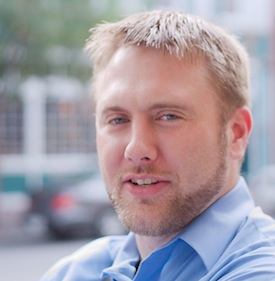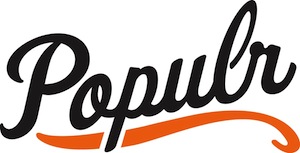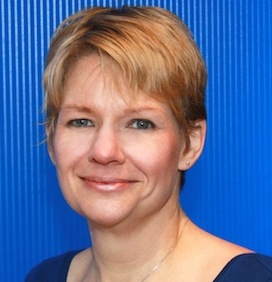

Nicholas Holland
The dazzling world of startup investors and the entrepreneurs that entice bets on success has been exploding in Music City.
Nicholas Holland, who describes himself as, “an avid supporter of the Nashville entrepreneur ecosystem,” created his first company at 23, then sold it at 26. Next he started the highly successful CentreSource, an Interactive Agency which he recently stepped down from to helm his latest venture full time—Populr.
Populr is all about creating published one-pagers online or Pops. CEO Holland and his group of investors, which includes music industry notables such as Joe Galante, Mark Montgomery and Paul Schatzkin, are convinced Pops will take root and eventually occupy an essential place in every marketer’s toolbox.
Also featured in the following interview is Populr’s Senior Communications Strategist, Heather McBee, who previously served as VP, Marketing and Web Initiatives for Sony Music in Nashville. McBee’s unique perspective creates a strong understanding of how the new product can interface with the entertainment community.
In the following discussion we asked Holland and McBee about Nashville’s entrepreneur community, how they characterize the new company and the colorful journey which has brought Populr into existence.
BossRoss: Nashville, with its traditional roots and Bible belt values seems an unlikely place to birth a technology/entrepreneurial hotbed. How did this happen?
Nicholas Holland: Back-to-back recessions across America created an environment where people’s primary source of wealth collapsed—their homes. At the same time we all have email addresses, interface with a variety of social and virtual connections and have become comfortable interfacing through computers and mobile to a larger world. Finally, Nashville is experiencing a much stronger economic vibrance than many other cities across the country. The result is that individuals have lost trust in corporate America and their personal finance vehicles and have found themselves wanting to build wealth outside that system.
BossRoss: And these changes created a group of wanna-be investors and entrepreneurs?
Holland: Yes. Overall, the changes have created situations where access to capitol is no longer restricted to brick and mortar ideas. You can actually start a business with just a computer and smart phone. As we’ve moved from a blue collar to a services society the exchange of goods has become more fluid because it’s really just information. So you have a reason to become an entrepreneur, access to become an entrepreneur and finally a city which very much supports it. The overall impact of entrepreneurship is sometimes small, but the irony is that it makes a huge splash in terms of its allure and appeal. Ninety-five percent of startups fail but they still gather fans who want to cheer for the underdog. I hear people saying all the time, “If I didn’t have two mortgages and four private school kids I’d love to do what you are doing.” And that creates the investor ecosystem which makes it all possible. Over the last 7 years in Nashville we saw the Entrepreneur Center and various funding groups emerge. Media publications then began attributing more of their pages to these efforts. The culture of entrepreneurship is on fire across the country. But Nashville is three degrees hotter than everywhere else, which makes it such a great place to be.
 BossRoss: When was Populr born?
BossRoss: When was Populr born?
Holland: It started officially in Nov. 2011, but really began a few years earlier. My agency, CentreSource, required a lot of high touch communications. I wanted to step up our sales efforts with something more than email and attachments, something on the web. Our clients were immediately drawn to the idea of being able to easily create pages online. The web is active, visual and live vs. email which goes out of date as soon as it’s done. People wanted to use it for sales, internal communication, training and customer on-boarding. Unfortunately, our first and second prototypes simply didn’t work and we put our plans on the back burner. When we came into 2011 my team wanted to try again. I told them, “Anything above expenses and taxes up to $10k per month I will give back to the team. So if you build a recurring business model and it brings in $10k a month you guys can buy iPads, Kindles, beer whatever you want.” We named the project “10k.” Two weeks later they returned wanting to build Upopper! By the end of February the name evolved to Populr. We got the .me domain, built the logo, established some branding and the team promised a June delivery.
BossRoss: This sounds easy. Everything went according to schedule, right?
Holland: No. First we missed June, then July and it still wasn’t ready. I thought, “this is going to kill me.” But I remembered something my family said, “If your business doesn’t run without you it isn’t really a business.” I began to toy with the idea of stepping down from CentreSource to build Populr as a separate company, full time. Bullpen, a Nashville microfund accepted me, so I stepped down from CentreSource, recruited two team members and we began building Populr full time in Nov. 2011. We moved into the Entrepreneur Center a month later and by April our first version was ready. My mentors insisted we formalize the business model immediately so we added a slew of features such as collaboration, team sharing and security. It took us another four months to get that done, but amazingly by late August 2012, but we had arrived squarely in the Alpha stage.
BossRoss: What about the financing?
Holland: It wasn’t a cinderella story. I put in about $125k of my own money and then raised another $450k in a convertible note. At our current burn rate that should take us through the end of this year. We’re being capitol efficient and making money, but it is still a big chunk of cash. We have nine employees.

Heather McBee
BossRoss: Heather, how do one-page web sites fit into the big picture of social media and branding?
Heather McBee: Your website remains the core, the home where you return. Populr becomes an extension of that home base. It offers the flexibility to quickly create and launch a page without having to call a developer and go through a multi-day or week process. Then you spread it via social media, email, all the venues. The sites are mobile optimized so they work beautifully in that space as well.
BossRoss: How do people use these one-page sites?
McBee: They are highly interactive which creates lots of possibilities. The Lost Trailers, for example, are using Populr in a variety of new ways. After a show in Detroit they’ll record a special message, add some fan photos and create a Pop. Next they publish it via social media and geo-targeted posts on Facebook. It gives them a way to go back into the market quickly and easily with custom branding and reinforce that fact they were just there. Big Machine Label Group is using Populr in another way—to contact radio and deliver assets. Instead of sending emails to station PDs with an attached MP3 file, bio and three paragraphs of information; they send a link to a highly dynamic environment. And they can track who opened it, what each programmer clicked on and how much time they spent. Leadership Music and the Americana Music are using custom themes and finding unique ways to reach their membership.
BossRoss: How do you see adoption spreading in the entertainment industries?
McBee: Right now we’re building some innovative case studies. Nashville is our core, but as it grows we’ll start reaching out to labels in New York and L.A., management companies in Austin and everyone else around the country. We know this platform is also perfect for film, TV and books. There are so many applications for these one-page sites that it just continues to grow.
BossRoss: I noticed the CMA used a password protected Pop to provide documents and information at its recent Board of Directors meeting which I attended. It was convenient having all the files (downloadable) in one place.
Heather: We’ve also suggested additional uses to them like preparing sponsor pitches for the CMA Music Fest or CMA Awards and to provide digital tools and assets for street teams.
BossRoss: What is the biggest difference between the entrepreneur space and the music industry?
McBee: It’s fast and flexible because decision making doesn’t take large committees or repeated meetings. In the music business there are expectations about royalties, systems, accounting and people you are accountable to plus multiple gate keepers that touch every artist. On the entrepreneur side you walk in every day with the feeling you can change the world, because you’re creating something no one else has done.
BossRoss: Nick, what’s next on Populr’s entrepreneurial roadmap?
Holland: We’ve already checked off the typical seed investment boxes. We’ve built and launched a product plus validated that people will naturally gravitate to the product and upgrade and pay without our involvement. Our biggest chore now is the conversation which goes, “That’s impressive. How do I use it?” People want it to replace something. They ask, “Does this get rid of email marketing? Or my website?” We’ve learned Pops are like the tablet in that it’s about expanding how you consume media not replacing a previous device.
BossRoss: Do you have other competitors in the space?
Nicholas: We haven’t seen any direct competitors. But there are some consumer-based one-page builders like www.about.me which creates online business card/bio pages. People are experimenting with the micropublishing concept, but we haven’t seen anybody on the B2B side which we believe is a much broader application.
BossRoss: How do you describe Populr?
Holland: There’s three things we say to position it. Populr is very effective at creating engaging online content quickly and easily. Then through sharing across social media, email and other channels it helps you gain attention and be heard. Finally, it helps you improve your message with its Micro-Analytic tracking tools that deliver critical insight into who is reading, opening, sharing and responding to your communications. Ultimately the question becomes, “If you can easily create and share a single page what would you do with it?”

Category: Exclusive, Featured, Sales/Marketing
About the Author
Journalist, entrepreneur, tech-a-phile, MusicRow magazine founder, lives in Nashville, TN. Twitter him @davidmross or read his non-music industry musings at Secrets Of The ListView Author Profile


